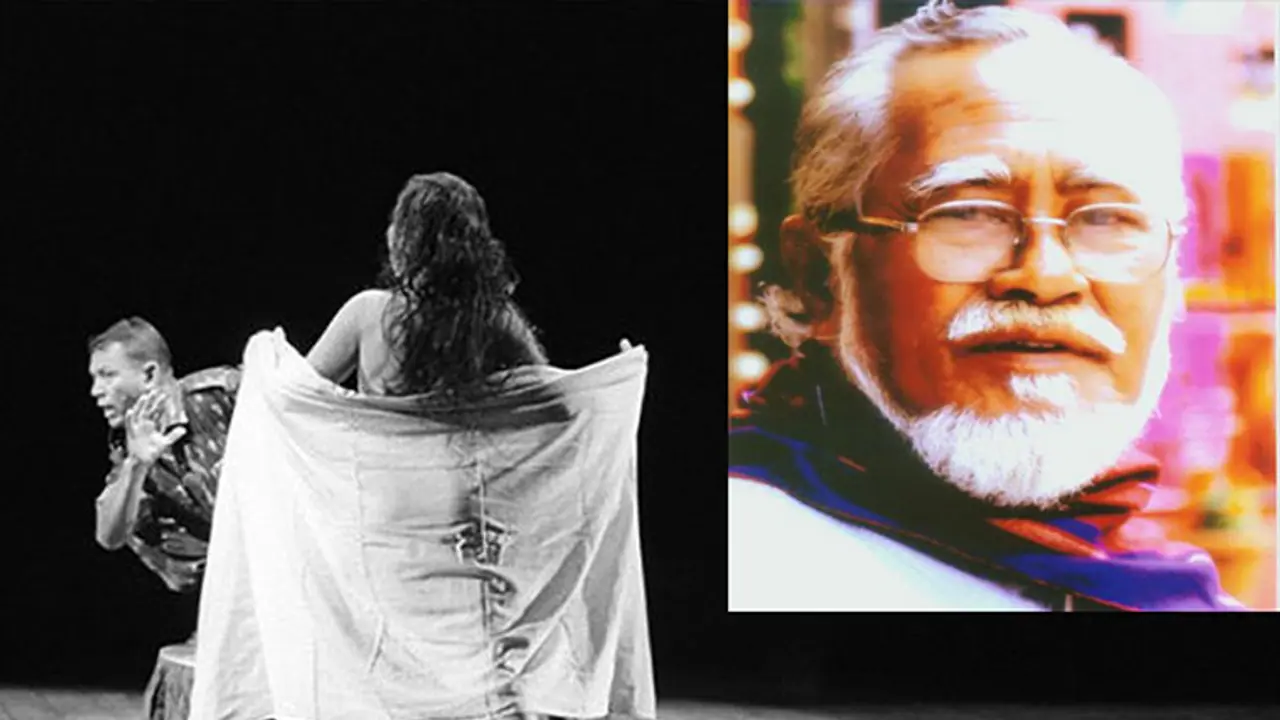Heisnam Kanhailal died on Thurday battling lung cancer and an apathetic government. He is the recipient of Padma Bhushan (2016) and Padma Shri (2004). In 1969 he founded Kalakshetra Manipur and worked as its director for 47 years.
"Real theatre cannot be found in the cities or festivals of theatre. Real theatre which is essentially about human relationship and can only be found away from the city, close to the nature. My theatre is about the senses and that's why I avoid verbal text as far as possible and always rely on universal sounds and intuitive physical movement for narrative exposition," - Kanhailal

Kanhialal represented the intense world of contemporary experimental theatre that somehow personifies Manipur. In the early 70s, when a generation of theatre innovators broke away from the dominant proscenium theatre, he, along with Ratan Thiyam, Ebotombi and Lokendra Arabam, were experimenting with a new idiom to reflect the general mood of discontentment, disillusion and marginalization.
The search for identity became a conscious exercise.
Heisnam Kanhailal died on Thurday battling lung cancer and an apathetic government reluctant to help one of the strongest influences in Indian theatre. He is the recipient of Padma Bhushan (2016) and Padma Shri (2004) for his contribution to Indian theatre. In 1969 he founded Kalakshetra Manipur and worked as its director for 47 years, constantly exploring a new vocabulary of theatre.
His language that defies language has a personal history; his frustration at getting expelled from National School of Drama, NSD in 1968 for poor communication skills in Hindi and English language is what compelled him to search for a non-verbal idiom of theatre.
He once said, "If not for my rustication from NSD because of my lack of communication skill in either Hindi or English, I would not have become what I am today. I would have remained stagnant with institutionalised plays of the 'urbanised theatre' made for the global theatre audience. My expulsion challenged me to re-look into theatre practice to prove that communication of the senses is possible without dialogue."
At Kalashetra, which he founded with Sabitri, he first started doing intimate theatre, Badal Sircar style. But then he went probing deeper and deeper into psycho-physical experimentation. There is a search within himself, a probing and questioning of the self and he was assisted with his brilliant actor wife Sabitri drawing, from the mystic traditions unlike Thiyam’s which was more eclectic and intercultural.
In an interview in 1996, to Seagull Theatre Quarterly, Kanhailal narrated his journey. "For me," he said, "the 70s was the most creative period in my life. Whatever I did in the 70s, I did instinctively and intuitively. I could not analyse what I did. I could not even formulate a methodology of my own. I felt the necessity of analysing, but academically and intellectually, I was not equipped to do it systematically. So I gave up almost all production work and decided to look afresh at my tradition, to study again all the performing and martial arts forms. It was a real challenge and it literally took years." During this period he hardly did any plays except 'Rashomon' in Kannada with with Rangayana actors. He said he wanted to test his methods not with Manipuri actors but with actors from other states, from different cultural backgrounds.
In one of his earliest plays, Tamnalai (Haunting Spirits, 1972), Kanhialal explores dark social forces, shaping the destiny of individuals. The dread of the midnight knock, so very familiar to Manipuris, was evident in 'KabuiKeiwoiba' (1973), named after the monstrous half-beast, half-man knocking at your door.
In the 80s he wanted to be an observer and an outsider at the same time. These two kinds of experiences were very essential for his subsequent work.
One of his most talked about plays, Mahasweta Devi's 'Draupadi' (2000) stunned the audience by its bold political statement. Sabitri played the character of Draupadi, stripping on stage. Many were offended then. Four years later, in a similar act of nude protest 12 mothers of Manipur stripped in full public view and shouted ‘Indian Army Rape Us’ in front of the historic Kangla gate in Imphal in 2004. That shocked the world.
Kanhailal in most of his plays re-examined the concept of freedom, beauty and oppression from the context of Manipur’s lived experience. He wanted to develop a sensuous theatre in which would "awaken the senses of the audience and then come to the intellect, to help them come to their own reason after experiencing the theatre. Theatre is not just a spectacle," he said, "...it should be an experience."
